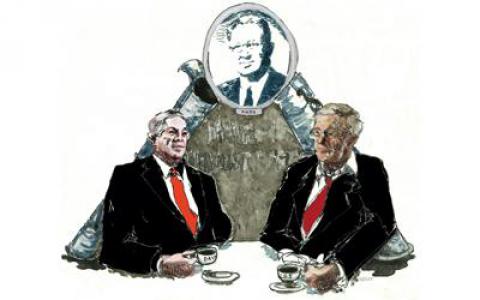Sons of Wichita: How the Koch Brothers Became America’s Most Powerful and Private Dynasty
By Daniel Schulman
Grand Central Publishing/Hachette Book Group, 2014
There is a specter haunting liberal America. It is Koch Industries and its tag team brothers Charles and David Koch. The septuagenarian pair from Wichita, Kansas, are fabulously wealthy energy barons whose massive money contributions to right-wing causes are responsible for the spread of Tea Party hegemony in the already business-friendly Republican Party.
The Kochs (pronounced like “coke”) are not the first deep-pocketed reactionaries to dabble in politics. But, as Mother Jones staff writer Daniel Schulman’s new book, Sons of Wichita: How the Koch Brothers became America’s Most Powerful and Private Dynasty, makes clear, these two MIT-trained engineers are doing something unique and more or less effective in politics. In contrast to the far right’s loonyness and the left’s penchant for short-term thinking that rarely looks beyond the next protest or election cycle, the Kochs are sticking to a 35-year game plan (or long con, in their case) for promoting a strategic political agenda that is turning social Darwinism into accepted policy, where government intrusion into corporate life is the bogeyman while greed and capital’s inherent irrationality are simon-pure.
With their lavish funding of a sprawling network of conservative advocacy groups, think tanks and libertarian-leaning academics, the Kochs have nurtured every present-day reactionary movement from voter suppression and union-busting to climate change denial. Their actions reflect a class-wide planning the United States did not encounter from older generations of plutocrats whose interests often stopped at the door of their own enterprises. It’s their militancy, patience and money that makes them provocative if not always successful — note their 2012 presidential and congressional election overreaching when they spent $400 million of their own money and got little in return.
Inside-the-beltway chatter has it that they plan to spend upwards of $290 million on their libertarian hobbies this year, including injecting $100 million into congressional and state campaigns.
Family Values
How do the boys do it? Schulman’s book is a quarry of information on what they do as well as a page-turner in its rendering of the decades-long dynastic feud between Charles, David and their two brothers over stock ownership in the family-run corporation. What isn’t clear from Schulman’s telling is why they do what they do, when other businesspeople tend toward the pragmatic if thoughtless.
There is some telling evidence, though. All four brothers were born into wealth, but an emotionally distant Fred Koch treated them more like groundskeepers than dynastic heirs. They didn’t grow up as playboys on the family estate outside Wichita, but as proverbial hewers of wood and drawers of water, and with a predisposition to think they were self-made men. Schulman’s narrative reads like a tale of overachievers with daddy issues.
When Fred Koch died in 1967, he left his sons shares in Koch Industries, the family-owned business, largely in oil refining, with a net value in the high millions. Today it’s the second-largest private U.S. corporation (exceeded only by Cargill) with sales of $115 billion in 2012. It’s involved not just in transporting energy but in numerous related ventures. It may be facile to see politics as a necessary outcome of one’s position either as a holder of immense wealth and power or as one of the wretched of the earth, but in the Kochs’ case, policy and ideology perfectly mirror interest.
What is Libertarianism Really About?
Nonetheless, Schulman takes the Kochs’ libertarian thinking at face value; it’s just a point of view like others, with a rich history dating back to the Austrian school of economics under Frederic Hayek and Ludwig Von Mises, and whose theories were said to be instrumental in reinforcing the prejudices the brothers got from their virulently anti-communist father. But there’s no explanation of what libertarianism is or its internal logic, let alone any critique. If socialism, as Hayek said, is indeed “The Road to Serfdom,” how so? And despite Schulman’s plea not to see an instrumental correspondence between laissez-faire ideology and the Kochs’ holdings in a giant energy corporation heavily dependent on petroleum distribution and retailing, what is “libertarian” about lavishly supporting front groups that slander environmental scientists as liars, or aligning with the religious Right?
The Kochs’ success is based not just on inherited wealth, hard work, and, last of all, brains and personality, but on gutting workers’ and consumers’ power along with a wolf-like penchant for wasting competitors. It’s also a sales job for an idea that can only benefit a handful. How many rich people can there be? And if libertarianism is more than naked self-interest bathed in smoke, aren’t its ideas worth at least a kitchen tour? Is all you need to know about this capitalist mindset that less government is more and federal regulations destroy initiative? That’s all Schulman has the Kochs offering.


Spread the word